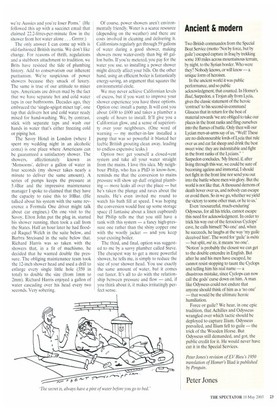Ancient & modern
Two British commandos from the Special Boat Service (motto 'Not by force, but by guile') escaped capture in Iraq by trekking some 100 miles across mountainous terrain, by night, to the Syrian border. Who were they? Nobody knows, or will know — a unique form of heroism.
In the ancient world it was public performance, and so public acknowledgment, that counted. In Homer's Iliad, Sarpedon, a Trojan ally from Lycia, gives the classic statement of the heroic `contract' to his second-in-command Glaucus that in return for the best of material rewards 'we are obliged to take our places in the front ranks and fling ourselves into the flames of battle. Only then will our Lycian men-at-arms say of us, "Well! These are no dishonourable lords of Lycia that rule over us and eat fat sheep and drink the best sweet wine: they are indomitable and fight in the front ranks of the Lycians." ' Sarpedon concludes, 'My friend, if after living through this war, we could be sure of becoming ageless and immortal, I should not fight in the front line nor send you out into the battle where men win glory. But the world is not like that. A thousand demons of death hover over us, and nobody can escape or avoid them. So in we go, whether we yield the victory to some other man, or he to us.'
Even `resourceful, much-enduring' Odysseus, for all his tricks, cannot escape this need for acknowledgment. In order to trick his way out of the ferocious Cyclops' cave, he calls himself 'No one' and, when he succeeds, he laughs at the way `my guile deceived him'. The word for 'guile is metis — but split, me ti,s, it means 'no one'. 'Notion' is probably the closest we can get to the double entendre in English. But after he and his men have escaped, he cannot resist stopping to taunt the Cyclops and telling him his real name — a disastrous mistake, since Cyclops can now call the gods' curse down on him. A man like Odysseus could not endure that anyone should think of him as a 'no one' — that would be the ultimate heroic humiliation.
Force or guile? We hear, in one epic tradition, that Achilles and Odysseus wrangled over which tactic should be deployed to capture Ilium. Odysseus prevailed, and Ilium fell to guile — the trick of the Wooden Horse. But Odysseus still demanded, and got, the public credit for it. He would never have cut it in the Special Services.
Peter Jones's revision of EV Rieu's 1950 translation of Homer's Iliad is published by Penguin.
Peter Jones


































































 Previous page
Previous page